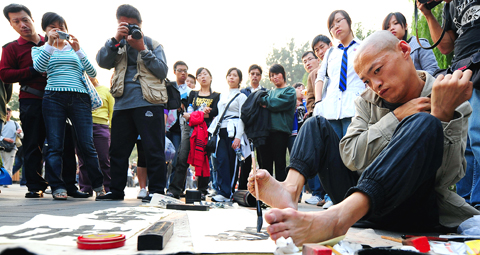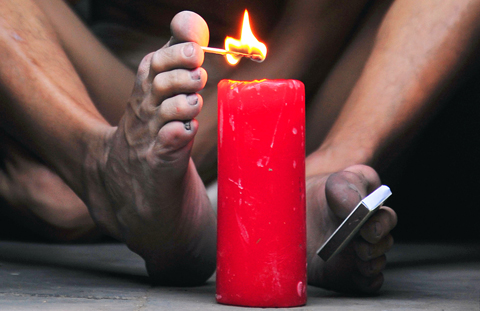Xi Fu’s name in English means “seeking happiness” and the Chinese street artist who has almost no use of his hands remains firmly on that path despite his handicap.
Xi, 30, was dropped by a nurse shortly after birth, causing the disability that has given him trouble walking as well as the problems with his hands.
He went to school for three years before being forced to drop out because the school found it too time-consuming to teach him, even though he had become as adept at using his toes and feet as others using their fingers and hands.

PHOTO: AFP
When he was 18, his mother took him to an arts center and asked about painting lessons for her son.
Seeing that Xi was smart and confident as well as skilled, the teacher was sure he could help and explained to Xi that many people made a living from art.
After three years of one-on-one training, the teacher declared it was time for the then 21-year-old “foot artist” to hit the streets and earn a living.

PHOTO: AFP
For the past nine years Xi has roamed across the Chinese capital, writing calligraphy and painting flowers with his feet.
In a good month he can earn 3,000 yuan (US$430), more than many Beijing office workers, selling his works for between 100 yuan and 200 yuan each.
While Xi said he has a passion for his work, he says it is not an easy life.
Often he sets up his paint brushes and scrolls in one of the city’s many pedestrian underpasses, though he must dodge police who would force him to move.
He said he often comes across insensitive and rude people, but said he accepts his fate.
“It doesn’t matter if you are normal or disabled, everyone has his or her bad moments,” he said.
In his more private moments he admits there is inner pain as he believes his disability makes it difficult for him to find a wife or girlfriend.
But Xi remains cheerful, pragmatically accepting his lot in life and confessing to feeling uncomfortable if he thinks people are pitying him.
“I’d like to find a girlfriend, but who wants a boyfriend who is disabled?” he said. “Women like you for your money, so if you are disabled, but have money, maybe a woman can like you, but if you are disabled and poor there is no chance.”
He believes that finding a partner who is also disabled could become problematic when they are older and unable to help one another.
As he lives with his parents, who own their home in a rural suburb south of Beijing, the money he earns enables him to have fun and socialize with his performance-art friends.
He particularly likes relaxing and drinking beer — an act he delicately performs with his feet, pouring beer from a bottle held in one foot into a glass held in the other.
He also loves music and can sometimes be found at local bars in the heart of Beijing’s ancient Drum and Bell Tower neighborhood, drinking or dancing to live music by Chinese folk and rock bands.
Xi said he overcomes his disability by living in the present, aware that he can work to earn a living and thankful he has good friends.
When asked what he will do when one day he can no longer earn a living, he replied defiantly: “I don’t want to think about that so much now. I’m not afraid and only think about being happy.”

Eleven people, including a former minister, were arrested in Serbia on Friday over a train station disaster in which 16 people died. The concrete canopy of the newly renovated station in the northern city of Novi Sad collapsed on Nov. 1, 2024 in a disaster widely blamed on corruption and poor oversight. It sparked a wave of student-led protests and led to the resignation of then-Serbian prime minister Milos Vucevic and the fall of his government. The public prosecutor’s office in Novi Sad opened an investigation into the accident and deaths. In February, the public prosecutor’s office for organized crime opened another probe into

RISING RACISM: A Japanese group called on China to assure safety in the country, while the Chinese embassy in Tokyo urged action against a ‘surge in xenophobia’ A Japanese woman living in China was attacked and injured by a man in a subway station in Suzhou, China, Japanese media said, hours after two Chinese men were seriously injured in violence in Tokyo. The attacks on Thursday raised concern about xenophobic sentiment in China and Japan that have been blamed for assaults in both countries. It was the third attack involving Japanese living in China since last year. In the two previous cases in China, Chinese authorities have insisted they were isolated incidents. Japanese broadcaster NHK did not identify the woman injured in Suzhou by name, but, citing the Japanese

YELLOW SHIRTS: Many protesters were associated with pro-royalist groups that had previously supported the ouster of Paetongtarn’s father, Thaksin, in 2006 Protesters rallied on Saturday in the Thai capital to demand the resignation of court-suspended Thai Prime Minister Paetongtarn Shinawatra and in support of the armed forces following a violent border dispute with Cambodia that killed more than three dozen people and displaced more than 260,000. Gathered at Bangkok’s Victory Monument despite soaring temperatures, many sang patriotic songs and listened to speeches denouncing Paetongtarn and her father, former Thai prime minister Thaksin Shinawatra, and voiced their backing of the country’s army, which has always retained substantial power in the Southeast Asian country. Police said there were about 2,000 protesters by mid-afternoon, although

MOGAMI-CLASS FRIGATES: The deal is a ‘big step toward elevating national security cooperation with Australia, which is our special strategic partner,’ a Japanese official said Australia is to upgrade its navy with 11 Mogami-class frigates built by Japan’s Mitsubishi Heavy Industries, Australian Minister for Defence Richard Marles said yesterday. Billed as Japan’s biggest defense export deal since World War II, Australia is to pay US$6 billion over the next 10 years to acquire the fleet of stealth frigates. Australia is in the midst of a major military restructure, bolstering its navy with long-range firepower in an effort to deter China. It is striving to expand its fleet of major warships from 11 to 26 over the next decade. “This is clearly the biggest defense-industry agreement that has ever